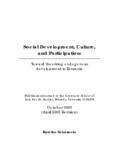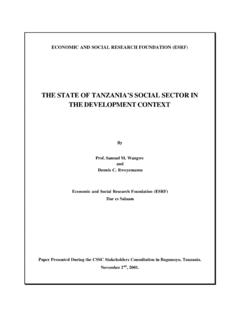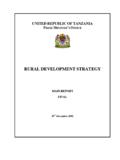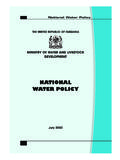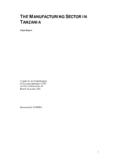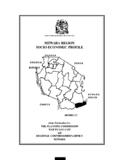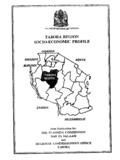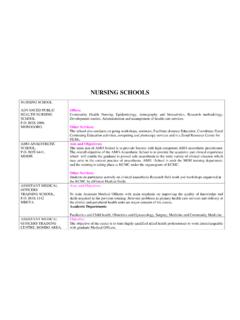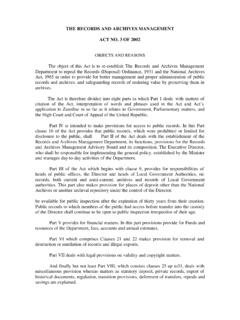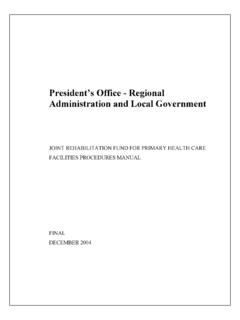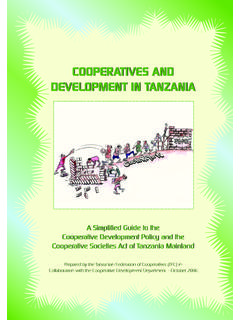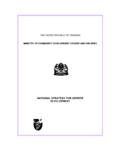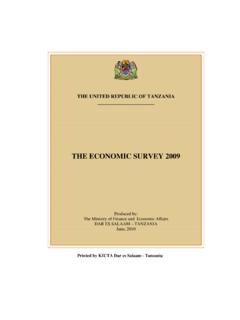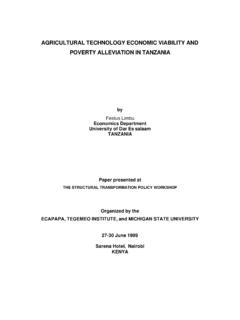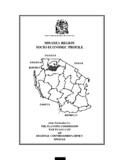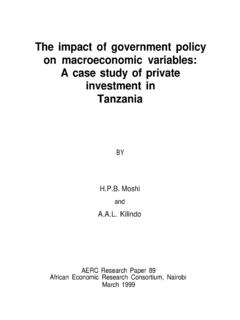Transcription of National Trade Policy - Tanzania Online Gateway
1 THE UNITED REPUBLIC OF TANZANIANATIONAL Trade POLICYTRADE POLICYFOR A COMPETITIVE ECONOMYAND EXPORT-LED GROWTHMINISTRY OF INDUSTRY AND TRADEDAR ES SALAAM, FEBRUARY 20032003200320032003 FOREWORDFOREWORDFOREWORDFOREWORDFOREWORD T anzania enters the Twenty First Century with hopeinspired by the goals of development Vision 2025 and ourdetermination to consolidate gains on the macro-economicfront and to face the economic challenges that lie inspiration has led to the determination to forge astrong, diversified, resilient and competitive this end all sectors have specific roles andcontributions to make in raising the pace of developmentto a dynamic self-sustaining level. In this regard, the tradefunction is seen as a central and pivotal pillar in theattainment of the mission of the economic sectors towardshigher efficiency, productivity and development Vision 2025 inspires and raises hope,the argument for Trade as the engine of growth anddevelopment in the face of globalisation needs no developments in the political, economic andsocial spheres are bringing about tremendous changes andchallenges in the business environment.
2 These changesentail radical shifts in international economic relations,evident in the Trade liberalisation and needs a Trade Policy that will ensure effectiveparticipation in the rules-based trading system that hasemerged at the international level and in seizing theopportunities inherent in the free flow of resources inherentin globalisation. The goal of Tanzania s National TradePolicy is to facilitate smooth integration into the MultilateralTrading System (MTS) and roll back the gradual descenttowards marginalisation. It is intended to ensure thatliberalisation offers meaningful, identifiable andmeasurable efficacy of Trade Policy depends on the establishmentof a specific macro-economic, social and politicalenvironment. When fundamental changes occur in theunderlying environment, the configuration of policystrategies also has to change. Consequently this policyreflects the dynamics of Tanzania as an economy initransition towards a market consequence of liberalisation is the de facto merger ofdomestic and international markets into a single marketand the necessity for domestic firms to becomeinternationally competitive even in internal markets.
3 Theimpact of globalisation is the accessibility to domestic firms,of resources that can facilitate enhanced productivity andefficiency necessary for competitiveness. In this setting,export-led growth is both an opportunity and a challengefor Tanzania . Tanzanian firms and entrepreneurs, liketheir counterparts in other parts of the world, have to strivetowards production of higher quality goods and first classservices at lower prices. The overall strategy includesreform of institutional structures and change of culturalnorms and practices in economic activities so as to put inmotion the process of re-orienting the economy towardsan open market system targeting Policy is presented in two documents - the main policydocument and one volume of annexes. The Annexespresent technical papers charting out the strategic pathfor Trade development . These documents are the outputof an extensive consultative process of involvedstakeholders from different walks of life in the public andprivate sectors, civil society and the academia.
4 Public andprivate sector institutions were represented in theTechnical Committee, established in March 2000, whichundertook the basic research and produced the first set ofworking documents. Moreover, this Policy document isan outcome of deliberations at various levels of the publicdecision-making Policy is, therefore, the outcome of joint effort by awide spectrum of stakeholders, reflecting public-privatesmart partnership. Its implementation equally depends onthe common effort of each one of us as we strive to curve aplace for Tanzania in the global economy and a niche for itsproducts in the international market place. As stated timeand again in the Policy , the private sector is the leadimplementer, the economic agent responsible for theiiproduction of goods and services that will enable Tanzaniatake its rightful place in the global market. The publicsector s primary role is that of facilitating this , because of the current weaknesses of the privatesector, the public sector is also expected to play the role ofstimulating private sector is the essence of the strategy that will enable Tanzaniato use her resources, especially her manpower base, toaddress economic challenges with the objective of attainingthe goals of the development Vision 2025, of povertyeradication within two and a half-decades.
5 The goal isachievable if all of us work together in a focused andstrategic Dr. Juma A. Ngasongwa (MP)MINISTER OF INDUSTRMINISTER OF INDUSTRMINISTER OF INDUSTRMINISTER OF INDUSTRMINISTER OF INDUSTRY AND TRADEY AND TRADEY AND TRADEY AND TRADEY AND TRADEDar es Salaam, February, es Salaam, February, es Salaam, February, es Salaam, February, es Salaam, February, AND ACRONYMSTIONS AND ACRONYMSTIONS AND ACRONYMSTIONS AND ACRONYMSTIONS AND ACRONYMSACP:Africa Caribbean PacificASDP:Agriculture Sector development ProgrammeASDS:Agriculture Sector development StrategyAIDS:Acquired Immune Deficiency SyndromeATI:African Trade InsuranceAU:African UnionBDS:Business development ServicesBET:Board of External TradeBEST:Programme for Business EnvironmentStrengthening for TanzaniaBOOT:Build Own Operate TransferBOT:Build, Operate and Transfer / Bank ofTanzaniaBRELA:Business Registration and Licensing AgencyCAMARTEC: Centre for Agricultural Mechanisation &Rural TechnologyCTI:Confederation of Tanzanian IndustryDDB.
6 Duty Draw Back schemeDFID:Department for International DevelopmentEAC:East African CommunityEDS:Export development StrategyEPZ:Export Processing ZoneERP:Economic Reform Programme/EffectiveRate of ProtectionEWURA:Energy and Water Utilities RegulatoryAgencyFCC:Fair Competition CommissionFDI:Foreign Direct InvestmentGATT:General Agreement on Tariff and TradeGDP:Gross Domestic ProductHIV/AIDS:Human Immuno Virus/AcquiredImmunity Deficiency SyndromeICT:Information and CommunicationTechnologyIF:Integrated FrameworkILO:International Labour OrganisationivISO:International Standard Organisation /Industry Support OrganisationJITAP:Joint Integrated Technical AssistanceProgrammeLDCs:Least Developed CountriesMAFS:Ministry of Agriculture and Food SecurityMCMM inistry of Cooperatives and MarketingMCT:Ministry of Communication and TransportMEC:Ministry of Education and CultureMEM:Ministry of Energy and MineralsMoF:Ministry of FinanceMFN:Most Favoured NationMIT:Ministry of Industry and TradeMFAIC:Ministry of Foreign Affairs and InternationalCo-operationMNRT:Ministry of Natural Resources and TourismMTN:Multilateral Trade NegotiationsMTS:Multilateral Trading SystemMWLD:Ministry of Water and Livestock DevelopmentNISC: National Investments Steering CommitteeNPHC: National Policy Harmonisation CommitteeNICs:New Industrialising CountriesNDC: National development CorporationNGO:Non Government OrganisationNTBs:Non Tariff BarriersPRSP:Poverty Reduction Strategy PaperPOPP:President s Office, Planning and PrivatisationPSI:Pre Shipment InspectionPSDS:Private Sector development StrategyR & D:Research and DevelopmentRTA:Regional Trading Agreements/AreasRoO:Rules of OriginSADC:Southern Africa development CommunitySIDO:Small Industries development OrganisationS&D:Special and Differential (Treatment)SSA:Sub-Sahara AfricaSME:Small and Medium EnterprisesvSTE:State Trading EnterpriseSOE.
7 State Owned EnterpriseSAP:Structural Adjustment ProgrammeSPS:Sanitary and Phytosanitary MeasuresSUMATRA: Surface and Marine Transport RegulatoryAgencyTBTs:Technical Barriers to TradeTAS: Tanzania Assistance StrategyTCCIA: Tanzania Chamber of Commerce,Industry and AgricultureTEMDO: Tanzania Engineering & ManufacturingDesign OrganisationTBS: Tanzania Bureau of StandardsTIC: Tanzania Investment CentreTPSF: Tanzania Private Sector FoundationTIRDO: Tanzania Industrial Research andDevelopment OrganisationTRA: Tanzania Revenue AuthorityTRIMS: Trade Related Investment MeasuresTSN: Trade Support NetworkUSD (US$): United States DollarVAT:Value Added TaxWMA:Weights and Measures AgencyWTO:World Trade OrganisationviNANANANANATIONAL Trade POLICYTIONAL Trade POLICYTIONAL Trade POLICYTIONAL Trade POLICYTIONAL Trade Policy , 2003, 2003, 2003, 2003, 2003 TTTTTABLE OF CONTENTSABLE OF CONTENTSABLE OF CONTENTSABLE OF CONTENTSABLE OF CONTENTS PageFOREWORDiABBREVIATIONS and.
8 INTRODUCTION .. LIBERALISATION AND GLOBALISATION HISTORICAL PERSPECTIVE,ECONOMIC INDICATORS AND POTENTIAL Historical Background .. Trade Liberalisation and Reorientation of Internal Trade .. FOR A National Trade Policy Domestic Market Considerations . The International Environment .. Re-orientation Towards Trade development .. OVERVIEW .. IN WORLD Trade AND THE PLACEOF SUB-SAHARAN AFRICA .. Tanzania : ECONOMIC PERFORMANCETRENDS .. Policy VISION, MISSIONAND OBJECTIVES .. VISION .. MISSION .. OBJECTIVES .. AND CHALLENGES FORTRADE Policy .. ENABLING Policy ENVIRONMENT .. Good Governance .. Macro-economic Policy Environment .. Legal and Regulatory Framework .. Economic Regulation and Competition CAPACITY development .. Human Skills development .. Private Sector development .
9 Institutional Capacity Building .. Transformation of Production .. Capacity .. INFRASTRUCTURE development .. CROSS-CUTTING ISSUES .. Trade and the Environment .. Trade and Gender .. DOMESTIC MARKET AND DEMAND ..CHALLENGES .. REGIONAL AND INTERNATIONALTRADE DIMENSIONS .. IMPLEMENTATION INSTRUMENTS ANDCOMPLEMENTARY SECTOR POLICIES .. Policy INSTRUMENTS AND Trade Policy TARGETS .. Policy INSTRUMENTS .. Tariff-based (Ad Valorem) Instruments .. Tariffs .. Taxation .. Duty Draw Back Export Taxes .. Non-Tariff Barriers/Measures .. Import Licensing .. Pre-shipment .. Customs Valuation .. TRIMs (Local ContentRequirement) .. Standards .. State Trading Operations .. Government Procurement .. Administrative Procedures . Trade Defence Instruments .. Safeguard Measures .. Anti-dumping .. Subsidies and CountervailingDuties .. Rules of Origin.
10 Trade development Instruments .. Export Processing Zones .. Investment Code and Rules Export Promotion and MarketLinkages .. Export Facilitation .. International Policy Instruments .. Bilateral Co-operation .. Regional Trading Arrangements The WTO Agreements .. PRIORITISATION OF Policy INSTRUMENTS SECTOR POLICIES ALIGNMENT .. FRAMEWORK AND ACTIONPLAN .. ROLES AND FUNCTIONS .. Public Sector - The Facilitator .. Private Sector - The Implementer .. Civil Society .. development Cooperation Partners .. Trade Policy development GROUP ANDSUPPORT NETWORK .. SEQUENCING AND CONTINUITY OFTRADE Policy .. Trade Policy IMPLEMENTATIONACTION PLAN .. Major Implementation Issues .. Sectoral Strategies and Programmes Implementation Matrix and Concepts Implementation Programmes and Projects Market Supporting Institutionsand Capacity Building .. Monitoring and Evaluation.
